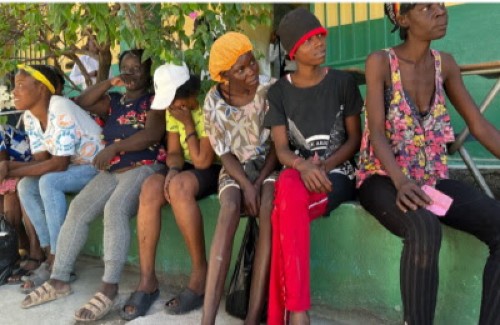Significant Number of Haitians Suffering From Acute Malnutrition
UNITED NATIONS – The Office for the Coordination of Humanitarian Affairs (OCHA) Wednesday said that escalating violence and displacement continue to drive severe humanitarian needs across Haiti.
 Haitians awaiting food outside a relief areaThe United Nations spokesman, Stéphane Dujarric, told the daily news briefing that the UN Children’s Fund and partners have screened more than 217,000 children for acute malnutrition since the beginning of the year, and more than 21,500 children have been admitted for treatment of severe acute malnutrition.
Haitians awaiting food outside a relief areaThe United Nations spokesman, Stéphane Dujarric, told the daily news briefing that the UN Children’s Fund and partners have screened more than 217,000 children for acute malnutrition since the beginning of the year, and more than 21,500 children have been admitted for treatment of severe acute malnutrition.
He said this represents about 17 percent of the nearly 129,000 children who are projected to need life-saving treatment this year.
“Our humanitarian colleagues also warn that insecurity continues to constrain the humanitarian response, leading to access challenges, supply shortages and the closure of health facilities.”
Dujarric said according to the latest analysis from the Integrated Food Security Phase Classification (IPC) an estimated 5.7 million people are facing high levels of acute food insecurity between March and June this year. This represents more than half of Haiti’s population.
He said beyond the nutrition crisis, Haiti’s children also face an education emergency. As of mid-July, more than 1,600 schools remained closed in Haiti, which is an increase of over two thirds compared to the start of the year.
“Our humanitarian colleagues warn that without access to education, children, of course, are more vulnerable to exploitation and recruitment by gangs. UNICEF has provided learning opportunities to more than 16,000 children, including displaced children in temporary learning spaces. The agency has also reached over 100,000 children with mental health and psychosocial support.”
Dujarric said, however, this is just a fraction of what is needed in Haiti.
“Our humanitarian colleagues also reiterate that a lack of funding is significantly limiting our capacity to address the crisis. Haiti remains, as I have said here many times, the least funded of our underfunded country appeals globally.
“More than halfway through the year, we’ve received less than nine percent of the US$908 million required for the response in this country,” Dujarric said.


